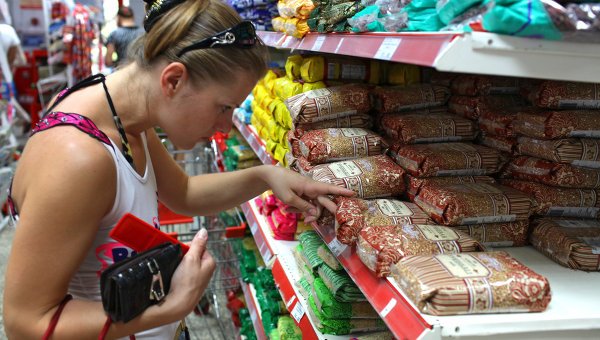Russian food prices are rising in parts of the country and experts say the state embargo on imports of Western food appears to be making things worse.
Since the ban was imposed on August 7, imported pork used in processed meat in Moscow has gone up by 6%, Russian business daily Kommersant reports.
In St. Petersburg, food prices have risen 10%. That inflation occurred even before the impact of sanctions.
Russia’s ban on many Western foods is retaliation for sanctions over Ukraine.
The St. Petersburg government’s economic policy chief, Anatoly Kotov, said the pork price had risen by 23.5% and chicken by 25.8%.

On August 18, Russia’s PM Dmitry Medvedev said he did not expect the ban on food imports to lead to price rises or shortages in the shops. He also said he hoped the ban – introduced for a year – would not last too long.
Nina Oding, an economist at St. Petersburg’s Leontief Centre, criticized “clumsy efforts by the state somehow to regulate price formation”. She said such efforts had failed in Soviet times, when goods simply disappeared from the shelves, and in Russia in the 1990s.
“We’re heading for restricted choice, more monopolistic tendencies, prices will rise – and we’re already seeing the start of that process,” Nina Oding told Russian business website RBK.
In Russia’s far east – the Primorye region and island of Sakhalin – food prices have gone up more than in Russia’s big western cities since August 7, Kommersant reports.
A regional agriculture official, Nikolai Borisov, said cheese prices had gone up by 10% and meat by 15% on Sakhalin. They were outstripped by the cost of chicken thighs, which rose by 60%.
In Primorye the cost of apples from China has reportedly risen by a third, while some meats have risen by 26% and fish by 40%.
The Russian ban covers a wide range of foods imported from the West, though there are exemptions for some categories, notably alcoholic drinks, baby food, pet food, coffee and olive oil.
Lithuania and Poland, western neighbors of Russia, are particularly hit by the ban on imports of fresh fruit and vegetables.
EU and US sanctions are targeting top Russian officials and key economic sectors, such as energy and finance, as Western leaders accuse the Kremlin of destabilizing eastern Ukraine by supporting the pro-Russian separatists there.
